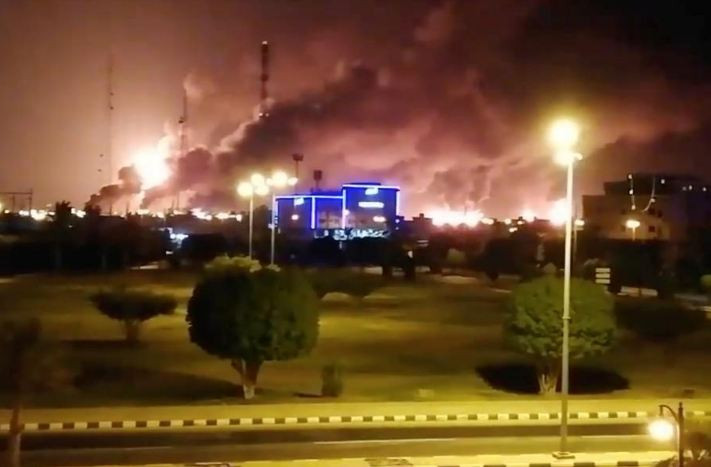This week will see if the devastating pre-dawn attacks on two of Saudi Arabia's main oil facilities -- one at Abqaiq and the other at Khurais -- by at least 19 Houthi suicide aerial drones Saturday will be severe enough to force a jump in world oil prices to $100 per barrel.
The highly successful surprise attacks forced the temporary shutdown of both vital facilities, effectively halving Saudi Arabia's total oil production, said the Ministry of Energy. News videos of the aftermath of the attack on Abqaiq, the country's main oil production facility, show the night sky ablaze after the aerial onslaught by suicide drones.
Abqaiq, which is located 205 miles northeast of Riyadh, is the world's largest oil processing facility and crude oil stabilization plant. It has a processing capacity of more than 7 million barrels per day (bpd). On the other hand, Khurais is the second-largest oil field Saudi Arabia with a production capacity of 1.5 million bpd.
Both installations are owned and operated by Saudi Aramco or the Saudi Arabian Oil Company.
Crude futures soared by as much as $10 per barrel following reports Saudi Arabia might take weeks to repair the extensive damage and return to full oil production capacity.
Some oil industry analysts noted that if 5 million bpd of oil production stays offline for very long, a quick return to $100/bbl oil is in the cards. One of these analysts tweeted, "Supply loss from KSA may be as high as 150 MM barrels/month. Oil may hit $100." Others weren't so pessimistic.
"A small $2-$3 premium would emerge if the damage appears to be an issue that can be resolved quickly, and $10 if the damage to Aramco's facilities is significant leasing to prolonged supply outages," according to Ayham Kamel, practice head for the Middle East and North Africa at Eurasia group.
Some Western analysts claim oil prices will temporarily spike in wake of the bold attacks. Should production at Abqaiq remain at half its normal level, this will remove nearly 5 million barrels of crude production a day from the market. This total equates to some 5% of the world's daily oil production.
The massive fires began after Abqaiq and Khurais were hit by drones, said the Saudi ministry of the interior in a statement broadcast by the state-run Saudi Press Agency.
Houthi military spokesman Yahia Al-Sarie said the rebels launched 10 aerial drones in a coordinated attack on both oil sites after allegedly receiving "intelligence" support from Houthi spies inside Saudi Arabia.
It's also not likely only 10 drones were used since the Saudis reported at least 19 explosions resulting from the detonation of these drones. The attacks were concentrated on the northwest of the Abaqiq refinery, suggesting to some the attack might either have originated from Iran or Iraq.
The refinery at Abaqiq is run by Saudi Aramco or the Saudi Arabian Oil Company. Saudi Aramco president and CEO Amin Nasser said no one was hurt in the attacks and emergency crews have contained the fires and have brought the situation under control.
The Houthis claimed responsibility for both assaults but U.S. secretary of state Mike Pompeo immediately blamed Iran for launching the attack using its surface-to-surface but without providing a shred of evidence to back-up his claim.
"Tehran is behind nearly 100 attacks on Saudi Arabia while Rouhani and Zarif pretend to engage in diplomacy," tweeted Pompeo. "Amid all the calls for de-escalation, Iran has now launched an unprecedented attack on the world's energy supply. There is no evidence the attacks came from Yemen."
The Ministry of Energy said both facilities will resume some production Monday. The attack's effect on world oil prices will also become apparent Monday.
Saudi Arabia and Yemen's Houthi rebels have been at war since 2015 when the Saudis and their allies invaded Yemen to shore-up the Yemeni government overthrown by the Yemeni Houthis. Iran is the major backer of the Houthis, who are also Shia Muslims.
Iran immediately rejected Pompeo's accusations. Iran's foreign ministry spokesman Abbas Mousavi said "Such useless accusations (referring to Pompeo's) are meaningless and not comprehensible and are pointless."
His statements were later echoed by Iranian Foreign Minister Javad Zarif.
"Having failed at 'max pressure', @SecPompeo's turning to 'max deceit'," tweeted Zarif Sunday afternoon.
"Blaming Iran won't end the disaster. Accepting our April '15 proposal to end war & begin talks may," Zarif added.






